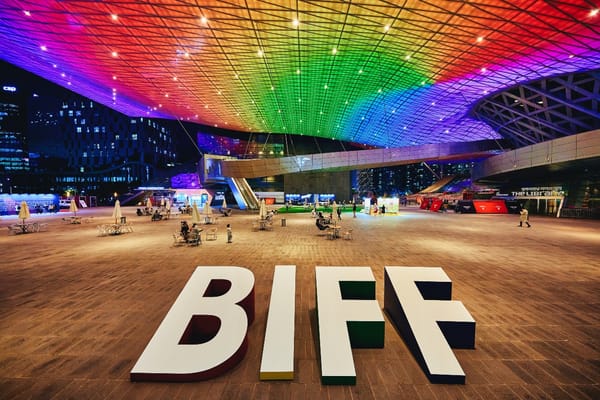Filmart Online; Hong Kong Films; China's Two Sessions; Ukraine Response; Indian Cinemas

Welcome to Streamlined, a weekly newsletter that will summarise and analyse events in the content industries outside the Americas & Europe.
For now, this is a labour of love and an experiment, so is free to readers, and does not have any sponsorship or other monetary support. It will run over the spring festival season, take a break over summer, then fire up again in time for the autumn festivals. I welcome your feedback, thoughts on what you’d like to see covered & tips on what’s happening in your part of the world.
THE WEEK’S TOP STORIES…
1. FILMART ONLINE
Filmart was the first big international contents market forced online by the pandemic in 2020, and this year is pushing bravely forward with its third virtual edition (March 14-17), at a time when the world’s attention is focused on the invasion of Ukraine and Hong Kong is experiencing its fifth, and by far most serious, wave of Covid-19.
It’s fair to say many film buyers and sellers around the world have reached peak Zoom fatigue; Asian theatrical buyers are more cautious than ever, following constant waves of Covid-induced cinema closures and seating restrictions; and Asian sellers don’t have a huge volume of new titles to launch, due to production/release delays and increased difficulties in raising investment. Hong Kong cinemas have been closed since January 7, and while mainland China’s are open, few independent foreign films are being cleared for release (more on that in coming weeks). Box office in Japan and South Korea has yet to return to pre-pandemic levels.
Despite all this, the volume of theatrical business at the recent European Film Market (EFM) in Berlin is encouraging; the streamers continue to buy aggressively, and there’s a general sense in Asia that we’re seeing the light at the end of the tunnel, even if nobody knows what kind of world we’re emerging into. Many are treating Filmart as an Asia-focused warm-up to Cannes, which at this point is still looking like it could be the first big physical industry gathering, so in that sense Filmart will be playing the same role this year it has always played.
Perhaps wisely, given the sheer number of seminars about streaming over the past two years, Filmart is exploring a new topic in its Entertainment Pulse conference programme – the mysterious world of blockchain, NFTs and the metaverse. Speakers include Meta’s Asher Rapkin; Sébastien Borget, co-founder of The Sandbox (owned by Hong Kong’s Animoca Brands); Blockchain Creative Lab’s Melody Hildebrandt and Decentralized Pictures’ Leo Matchett. Hopefully, these sessions will shed some light on what exactly these new technologies offer content creators. Another key session features Disney’s regional content chief Jessica Kam-Engle.
Before Hong Kong’s fifth wave, the territory only had around 12,000 infections and 200 deaths throughout the entire pandemic. Those figures have now climbed to 617,419 and 3,150 respectively, with the unvaccinated elderly hit especially hard. Due to the scale of the outbreak, Hong Kong’s government has abandoned its policy of isolating everyone who tests positive in special facilities, but is still planning mass testing and some form of lockdown, timing TBC, sparking an exodus of locals and expats. Bizarrely, nine countries are still banned from flying to Hong Kong and returnees face two weeks quarantine, so Hong Kong industry execs are waiting to see if the rules change and they can travel to Cannes.
Both Hong Kong International Film Festival (HKIFF) and the Hong Kong Film Awards have been forced to postpone due to the current outbreak, with the latter event tentatively scheduled for June 2022.
Filmart organisers, the Hong Kong Trade Development Council (HKTDC), are hoping the market will return as a physical event in 2023.
2. HONG KONG FILM & TV INDUSTRIES
Filmart is usually a time to focus on the content industries of Hong Kong, and right now, they’re facing unprecedented challenges on both a financial and political level.
Being positioned as the ‘gateway to China’ has always been a double-edged sword for the Hong Kong film industry, which soared with that market’s growth from the early 2000s, but has been relegated to a supporting role now that China has the money and technical smarts to make its own blockbusters (although it’s worth noting that two of the three directors on China’s highest-grossing film ever, The Battle At Lake Changjin, are Hong Kong filmmakers). Outside China, international theatrical sales of Chinese films have declined as that space has contracted to a handful of specialist buyers.
China’s increased censorship and ideological realignment; the imposition of the National Security Law (NSL) in Hong Kong, and Covid-induced cinema closures, haven’t helped matters. Five rounds of cinema closures, especially the current one (January 7 to April 20), are taking their toll on an exhibition industry already struggling with record high rents, and local circuits have started quietly giving up sites when their leases expire. One of Hong Kong’s biggest film investors, Sun Entertainment Group, has been quiet since controlling shareholder Alvin Chau was arrested in connection with his Macau-based casino VIP junket business last year. Meanwhile, the billions in content investment issuing forth from the global streamers has mostly bypassed Hong Kong [analysis here on why, an old article but still relevant].
And yet, Hong Kong content actually had a stellar year in 2021 – Better Days was nominated for best international feature at the Oscars; old school actioner Raging Fire was a decent hit in China; boy band Mirror continued its meteoric rise as the biggest Canto-pop sensation in over a decade; and partly due to an upsurge in socially conscious filmmakers, several Hong Kong films, including Drifting, Time, Limbo and Anita, played at international festivals last year. [check out SCMP film editor Edmund Lee’s comprehensive review of Hong Kong films released in 2021].

Documentaries about Hong Kong’s protest movement are also winning international recognition, in particular Kiwi Chow’s Revolution Of Our Times, which premiered at Cannes, and is currently a hit in Taiwan and moving audiences in Vancouver. Netflix et al may be ignoring Hong Kong, but local broadcaster ViuTV is bringing youth audiences back to Cantonese-language TV, while its sister streamer Viu has become a regional success story.
After two decades of living here, Streamlined can’t pretend to be impartial, but Hong Kong’s film industry does have a habit of writing itself second, third and fourth acts. Every local producer, director and writer I talk to these days is busy developing content, both films and series, and trying to figure out where the market is heading. Whether these projects get made in Hong Kong or outside (several directors have relocated since the introduction of the NSL), Hong Kong talent will continue to make its mark in the region.
On the sales front, local studios’ production and release schedules may have been delayed, but a fair amount of titles, either in production or waiting for the appropriate release platform, are being sold at Filmart [I’m hosting content on my existing website Chimeconnect ahead of a rebranding]. There’s also a slew of films on the way from younger filmmakers that are supported by the Hong Kong Film Development Council and HKIFF Industry. More on those next week.
3. CHINA’S ‘TWO SESSIONS’
Today is the final day of China’s ‘Two Sessions’, or meetings of the CPPCC [China People’s Political Consultative Congress] and NPC [National People’s Congress], one of two big political events this year, the other being the Communist Party’s National Congress in the autumn. While regulation of the metaverse got a mention, there wasn’t much discussion of the film and TV industries, as Chinese regulators had already set forth their policy for the film sector in the ‘14th Five-Year Plan (2021-25)’ at the end of last year. But the event is always worth watching to gauge the political temperature in Beijing.
The main takeaways this year is that China has set a growth target of 5.5%, seen as ambitious given the country’s ongoing Covid restrictions and property sector slowdown, and there will be no easing of the “common prosperity”, tech regulation and anti-monopoly drives that have rattled China’s tech and entertainment industries over the past year. Beijing does not appear to have altered its position on Ukraine, saying it respects state sovereignty, but not condemning the Russian invasion. Foreign minister Wang Yi was at pains to state that Ukraine and Taiwan’s situations are “fundamentally different”, describing the Taiwan issue as a “purely domestic affair”, rather than between two countries.
Of most interest to the content industries is whether China is likely to open its international borders (the border with Hong Kong also remains closed) any time soon. But given what is currently happening in Hong Kong, and what has been described as “sporadic outbreaks” of Covid in China, this remains unlikely. On March 10, China reported that Covid cases had nearly doubled to 402, and we know Omicron is sneaky, so the country may be facing its biggest pandemic battle yet.
4. RESPONSE TO UKRAINE INVASION
Film festivals outside the Americas and Europe have been relatively quiet in their response to the invasion of Ukraine and none have announced outright boycotts of Russian films or delegations. Similarly, no Asian entertainment companies have made statements, but then few have significant business interests in Russia. South Korea’s Busan and Jeonju film festivals made statements in support of Ukraine and condemning the invasion, but have not announced boycotts.
Earlier today, Tokyo International Film Festival issued a statement expressing its “deep concern over this situation, in which people’s lives and their rich culture, including films, are now in jeopardy. As an organization that aims to contribute to the promotion of global friendship and culture through cinema, Tokyo International Film Festival feels the hardships of those affected by the crisis as our own and is committed to supporting the films and art produced by them, regardless of national borders. For these reasons, we strongly call for a peaceful resolution to this crisis as early as possible.” The festival concluded by saying it was exploring what measures should be taken at this year’s edition in October-November.
Tracking social media, some filmmakers and film critics in Asia have commented that, while they also support Ukraine and condemn the invasion, they do have some questions over the concept of cultural and artistic boycotts, and their efficacy in responding to Vladimir Putin, a man who has just severely curtailed freedom of speech in his own country. These are complex issues and worthy of further debate.
5. INDIAN CINEMA CONSOLIDATION
Indian press reported this week that two of India’s largest exhibitors, PVR Cinemas and the Indian arm of Mexico’s Cinepolis, are in advanced merger talks. If the deal goes through, the combined entity would own more than 1,200 screens, about twice the number of India’s next biggest exhibitor Inox Leisure. Cinepolis would reportedly be the biggest shareholder in the merged company with a stake of around 20%, while PVR founder Ajay Bijli would have management control for at least three years.
The news is not surprising given the battering Indian exhibitors have received during the pandemic. Even now, when cinemas are mostly open across the country, some big Hindi films are opting for digital premieres or pushing back release dates, as box office numbers are nowhere close to pre-pandemic levels. India’s Outlook magazine recently ran a story casting doubt on the reported healthy box office figures for Sanjay Leela Bhansali’s Gangubai Kathiawadi, currently on release after a premiere at Berlin film festival, but then India’s box office figures have always been notoriously difficult to verify.
6. MAMI MULLS FUTURE DIRECTION
Indian press has also speculated that the struggles of cinema and hotel groups may have contributed to Mumbai Film Festival’s decision to cancel this year’s edition, despite the fact Mumbai theatres are open and Omicron levels relatively low. PVR and JW Marriott, both hit by the pandemic, are supporting partners and major venues of the festival, with Reliance Jio is the title sponsor. Festival organisers, the Mumbai Academy of Moving Image (MAMI), alluded to having lost a sponsor, but isn’t commenting directly, and there may be other factors at play.
The festival, which was initially scheduled to start today as a hybrid event, took a relatively late decision to cancel, citing “logistical and financial challenges” and offering online screenings to the selected films (Feb 24-March 16). This prompted a group of filmmakers to publish an open letter criticising the move. MAMI responded by saying “we are working on a plan to manage a physical screening for films in our selection that do not screen in India in the near future”.
Mumbai film festival’s official selection can be found here. The festival’s last physical edition was in October 2019, and while its year-round online programmes have been successful, not all the filmmakers selected for its 2022 edition opted for online screenings. Details of physical screenings have yet to be announced. MAMI is now understood to be in the process of figuring out next steps for future editions of the festival.
It’s been a brutal few years for film festivals, but all this goes to show that even after two years of online screenings and virtual events, many filmmakers still feel that the best platform to premiere their film is in a physical theatre with an in-person audience.
7. RELEASING THIS WEEKEND IN CHINA
After a trickle of Hollywood and other foreign titles in China throughout 2021 and the first few months of this year, several titles have been cleared for release over the past few weeks. Sony’s Uncharted is scheduled to open on Monday, March 14, followed by The Batman on Friday, March 18.
Roland Emmerich’s Moonfall, co-financed by China’s Huayi Brothers, is scheduled for March 25; Sony’s animation Hotel Transylvania: Transformania will be released April 3, coinciding with the Qingming Festival; and Warner Bros’ Fantastic Beasts: The Secrets Of Dumbledore is set for April 8. So far this year, none of the US studio releases – The Matrix Resurrections, Encanto, Paw Patrol and Death On The Nile – have performed well.
Among other foreign films, this weekend sees the release of Taiwanese romantic drama Do You Love Me As I Love You (2020) and Japanese anime Yokai Watch: Forever Friends (2018). Indian sports drama Kanaa, a Tamil-language film released in India in 2018, is scheduled for March 18.
IN OTHER NEWS…
- Variety reported on a probe into Japan’s biggest exhibitor, Toho Cinemas, by the Japan Fair Trade Commission on anti-trust grounds. Local press alleges that Toho was pressuring local distributors to supply it with films on an exclusive basis.
- Japanese broadcaster Nippon TV announced a strategic collaboration with Disney to co-produce local-language content, including drama series, manga and variety shows, which will stream on Disney+ in Japan and overseas. The two companies will also share content on their respective platforms. The first series under the deal is The Files Of Young Kindaichi, scheduled to air on NTV from April 24 and stream on Disney+ shortly after.
- Variety also reported in an exclusive that former Amazon Studios head Roy Price, who resigned from the role following a sexual harassment claim in 2017, is launching a slate of Indian projects under this International Art Machine banner. Leading India talent including Shekhar Kapur, Preity Zinta, Amish Tripathi, Dibakar Banerjee and Suparn S. Varma is attached to the slate.
- Chinese streamer iQiyi announced that it had started streaming Korean drama Something In The Rain on March 3, marking the end of a six-year ban on Korean content in China. iQiyi said the series, which was broadcast by Korea’s JTBC four years ago, “quickly entered” its Top 5 Hot TV Series and a Chinese remake, The Way Love Should Be, starring Angelababy, is in the works.
That’s all for this week, sorry more epic than streamlined, but it’s a busy time in this part of the world. Next week will be shorter…




